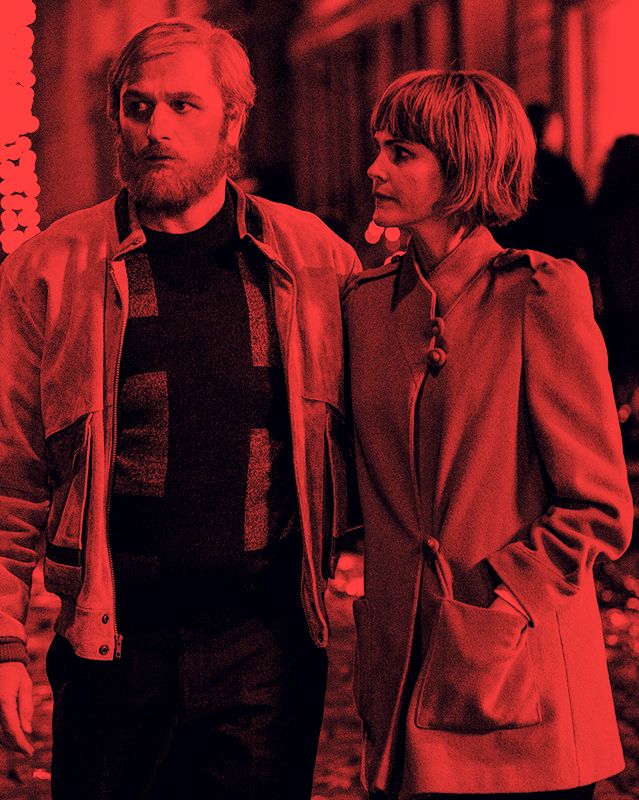FX’s Cold War drama The Americans — still inexplicably Emmy-less despite being hailed, internet-wide, as the best show on television — stars Keri Russell and Matthew Rhys as husband and wife Elizabeth and Philip Jennings, Russian KGB agents posing as Americans in the D.C. suburbs. On the eve of the fourth season, premiering March 16, Vulture sat down with showrunners Joe Weisberg and Joel Fields, in a co-production with The Vulture TV Podcast. Over an hour-long conversation, edited and condensed below, we discussed how the show has evolved, why they would redo season one, and how they feel about those comparisons to Homeland.
Gazelle Emami: I was rewatching the pilot recently and it’s so tonally different from the rest of the show. The sex in the first season is such a big part of their spy missions, and the show has moved away from that — there are still sex scenes, but it’s used more in terms of character development. Did you feel any pressure to have more sex on the show early on?
Joe Weisberg: Initially, there was still the idea that the sex might actually be a fun part of the show. “Look at these characters and their crazy lives and all the things that they do.” There’s a fantasy element to it. And even the tonal shift in general was that as Joel and I started working with these characters and stories, it didn’t take long before we realized that if the show was going to have any level of truth or authenticity to it, we couldn’t tell these stories without all of the darkness coming to the fore. There was nowhere to go otherwise. One of the first elements of that was the sexual element of these characters’ lives — that it was just sad and scary and had incredible darkness to it.
GE: When The Americans first came out, a lot of people compared it to Homeland because that was the easy comparison to make. Since then, we’ve seen countless think pieces telling readers, “The Americans is so much better than Homeland, this is why you should be watching it.”
Joel Fields: First of all, I really enjoy Homeland, and I thought this last season was the best ever. That’s not to put down the other seasons, but I thought it was amazing that in a later season they elevated the show so much. I get the surface comparison because they’re both shows about spies, but they’re completely different genres. I can love Homeland, but Homeland is more of a spy show in the Bourne Supremacy sense or in the James Bond sense, whereas this is more about characters. It’s more John le Carré, and they happen to be spies. What we were aspiring to was something more along the lines of The Wire, Breaking Bad, The Sopranos.
JW: I think if The Americans had been cancelled, I’d be wandering the streets pushing a shopping cart with all my belongings in it and seething with resentment over Homeland. But as it turns out we’ve done great, and there’s really been a great space for both shows.
Matt Zoller Seitz: I’m torn between understanding that Emmys don’t necessarily correlate to quality and being really angry that you guys haven’t won a ton of them.
JW: We honestly don’t get very worked up about this. The truth is we’ve won a lot of other things. And there are a lot of really good shows that don’t win anything. I don’t mean to say it wouldn’t be great. We would love it.
JF: Any Emmy voters that are listening, we’d be deeply appreciative. Any space that could be made available on the shelves, we’d be thrilled. But Joe’s right, it’s hard to go to work every day on this show that we love and this incredible cast, the people we love, have the kind of critical response, to have all the people not only watching it but getting it and responding and plugged in to exactly where our heads and hearts are at in terms of what we’re trying to say. It’s hard to have all that, all the support from the network, have many other awards, and then be resentful about not getting the Emmy.
MZS: One of the things that’s most fascinating about the show, and what separates it from a lot of psychologically driven dramas on the air post-Sopranos, is it’s as psychologically driven as any other premium cable show, but the characters aren’t aware of themselves as psychological constructs.
JF: We have this running joke with our writing staff because we talk a lot about how these characters are not aware. Once we really pin down all of the dense thoughts and emotions that are colliding back and forth between the characters, we’ll say, “And remember, they’re unaware of any of this and can’t express it!”
JW: It’s a great challenge in writing and filming the show because, a) they’re unaware, b) they keep everything secret, so even the things they know they really can’t talk about with anyone. And then you get into a situation where if you’re filming scenes between these people, if you miss a facial expression, you might miss the whole scene, so it can get really tricky. We’ll be watching something in the editing room and say, “Oh no!” and say to the editor, “Wait, do you have that twitch that was supposed to be there? Or else the whole scene might not make sense.”
JF: Just recently, we actually excised a chunk of a scene because a twitch wasn’t there. We thought, Well, it’s not going to play, we’re going to have to save that character move for later.
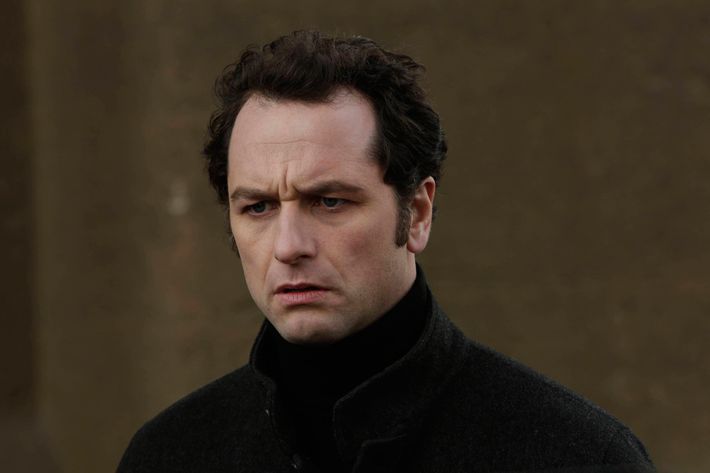
MZS: A fan of the show on Twitter was talking about Matthew Rhys’s performance over the seasons saying, “You would see his eyebrows going from this,” and he drew two flat, horizontal dashes, “to this,” and they were making a V-shape. Like the weight of the world is bearing down on his eyebrows.
JW: The thing is, Elizabeth is changing too, but, relative to her, he’s changing fast. But really, he’s changing slowly, and she’s changing extremely slowly.
GE: In the new season, you feel Elizabeth soften a little. There’s a dream sequence where I was like, “Oh my God, she has feelings … she’s thinking things I didn’t think she was thinking.”
JF: We had a real struggle last season because Joe and I, in the story of Paige’s recruitment, felt emotionally on Elizabeth’s side. It made a lot of sense to us that this was a way for her to reconnect with her daughter. That if this was something she truly believed in, there was a real act of love and connection here. That proved to be more challenging to convey than we expected because it seems obvious to us.
JW: I often feel we’re a little at odds with a section of the audience in terms of how they see Elizabeth. There’s a significant percentage that sees her as cold or an ideologue, and our perception of her is much more complex than that. I know there are people in our audience who also have a much more complicated view of her, but there are those who see her more simplistically, and to us, all those things about her, whether it’s her steadfastness in terms of her devotion to the motherland, which has elements of ideologue in it, but also has elements of being true to the things she believes in and also has elements of having deeply thought out conviction to it. Seeing her as cold is not something we believe in.
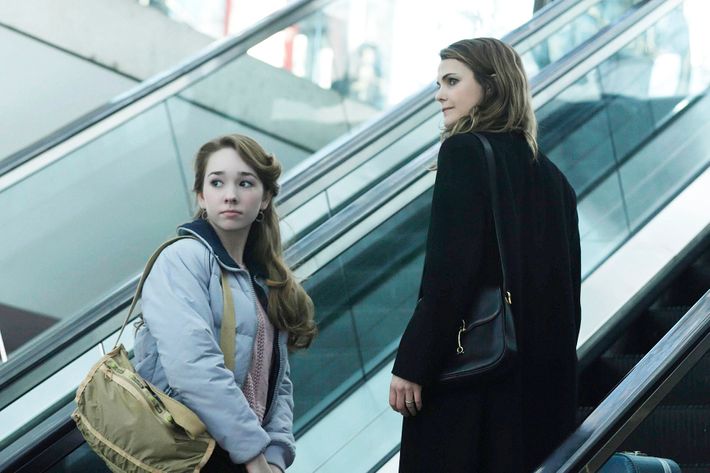
GE: What was the process like casting Philip and Elizabeth together? We know that Keri Russell and Matthew Rhys are together now in real life. Did you see that chemistry when you were casting them?
JW: Leslee Feldman, who’s the casting director at Dreamworks, had seen Matthew in a play, and it was her initial idea that he would really be great for this role, and a bunch of us started looking at his reels. I went to see his play, and he came in and auditioned a couple times. There was a chemistry-read with Keri, and they were pretty great together. I feel funny using the word “chemistry” because it wasn’t supposed to be a typical chemistry. But there was a lot of interesting electricity between [them]. I remember we used to tell the story a lot, of a scene they read where she slapped him in the face and he just took it and stared at her. It sounds like a cliché moment, but in fact there was something really wonderful in [it]. If you think of how odd that relationship was in that first season or in that pilot, where he has all these feelings for her that aren’t quite reciprocated, and yet they’ve been together a very long time, there is something deep and emotional between them — it was all in that moment in a lot of great ways.
GE: Keri Russell is also pregnant this season. I’m curious how you dealt with that in terms of how you film certain scenes.
JF: Every year at the wrap party, they put together a gag reel of funny gaffes and moments and little things that happened on set. They did a great series on different ways the baby bump was hidden — cuts of her with groceries, cuts of her with a laundry basket, cuts of her with more groceries. Coats, lots of coats! It’s just happy news that you work around. And it’s not uncommon to work around that. We had, I’d say, about half a season of not having to deal with it and then half a season of having to deal with it through CGI. And coats.
MZS: She’s chasing guys down the street while carrying a laundry basket.
JW: Yeah, exactly. [Laughs] Well, if you watch it with that in mind, you’ll be like, “Oh. Wearing a coat again. Coat in the bedroom. Coat in the bathroom!”
JF: One trick is, if you do two or three CGI shots per episode, we hope the audience will think less about the coat, the laundry basket.
MZS: I was going to ask you about that. It seemed to me that you’ve gotten more “location” shooting in Washington. By which I mean, you see the White House or the Washington Monument or something in the background and it’s like, “I think that might be Fort Greene Park.”
JF: Yeah, computers have made it easier to transport the actors. We actually go to Moscow this year via some green screen.
JW: On the Upper West Side.
[Laughter]
MZS: Can we discuss this idea of emotional continuity for the characters? There are two levels of emotion to the performances. They might be deceiving the people in the room with them but they can’t deceive us because we need to know what they’re feeling. This is hard enough on a show where people do one thing and that’s what they do and they’re not keeping all these secrets. But on this show, they’re often lying about who they are, lying about what they’re doing, and sometimes the lie about who they are and what they’re doing are different lies.
JF: It reminds me that Alison [Wright, who plays Martha] once came into our offices to talk about some character stuff and she had her script. She started flipping through the opening pages, and there was just scroll, it looked like A Beautiful Mind. And she said, “This is my character tracking for the episode.” The actors take this stuff very seriously. They’ve thought through these things and, when necessary, we’ll talk it through with them.
JW: And, you know, most of them have had nervous breakdowns during the run of the show.
JF: When it gets incredibly complicated, one of the things they look for is the simple truth. Really, characters are feeling what they’re feeling or trying to get what they’re trying to get.
JW: These scenes are all shot out of sequence. So there’s an emotional through line to the episode where at least it’s linear, but they’re just as likely to shoot the last scene of the episode first, the first scene last, and the middle scenes completely out of order, and they still have to keep track of their emotional through line.
JF: Worse than that, because we like to be ahead on script, what will sometimes happen is production takes advantage of that. Rather than shooting one episode out of order, they’ll say, “Hey. We’ve got three scenes that take place over six episodes, but we have six scripts. Instead of going to a hotel three different times over three different episodes that lay out over six, let’s figure out how we can bring in those directors and shoot them all in one day.” Well, that’s great for production, but very challenging for an actor who’s shooting all that stuff out of emotional sequence.
GE: You’ve said the show will end at season five or six. Are you thinking in terms of how you’re going to wrap things up at this point?
JW: Yeah, we are. We’ll do one or two more seasons and so, even if it’s two, to figure out how the next season leads into that, we have to really know where the story is going.
MZS: Can you at least promise that the show will go on long enough so that we can see Philip and Elizabeth being appalled while watching Rocky IV?
[Laughter]
JF: What year was Rocky IV?
MZS: That was Christmas of 1985.
JW: Yeah, I think we can come close to promising that.
JF: They’re going to watch The Day After this year.
JF: And they’re going to watch David Copperfield make the Statue of Liberty disappear.
GE: I heard there will be a David Bowie song as well?
JF: Yes! That was quite a moment for us because we had heard he was a fan of the show and we’re big fans of Bowie. We found just the perfect song and the perfect place, and that was the week he passed away. It was between our asking for the song and locking it in that he passed.
GE: Can you share what the song is?
JF: “Under Pressure.”
GE: In terms of their spy lives, Elizabeth and Philip have gotten away with everything up to this point. Are they untouchable heroes?
JW: I don’t really know the answer to that, but it would be interesting to think about what the show would be with one of them getting killed and the other one out as a single parent. I guess what I would say is that in a way there are two separate questions. One is, what are the choices we’d make for the show as a show? But in the show as a show, anything could happen. Anything that could happen in the real world could happen in our show.
GE: Teens on television can often be annoying and underdeveloped, especially when they’re on adult shows, not teen shows. Paige has been such a refreshingly complex character. How early on did you know that you were going to make Holly Taylor such a pivotal part of the show?
JW: We always knew that the unfolding of her finding out the truth and what that would create for the family would be a part of the show. I don’t think we quite knew that it would take up this much space of the show.
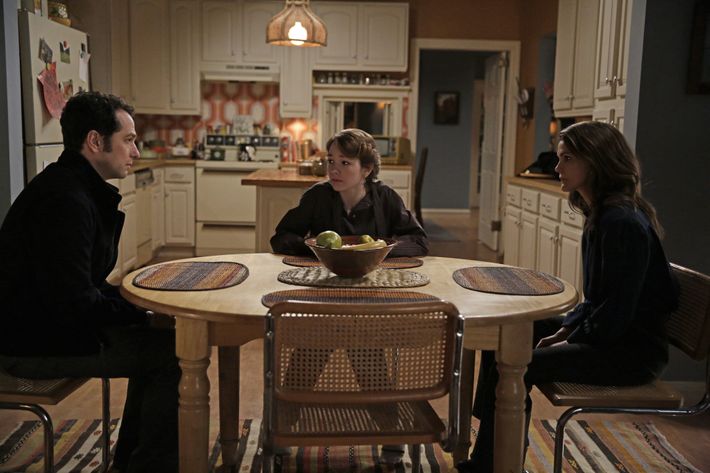
JF: The thing that occurs to me is, I don’t know what we would have done if Holly Taylor had not blossomed into such a brilliant young actress.
GE: This season we have Henry growing up a bit. He’s much taller.
JF: Suddenly. Over the course of a week that happened to correspond with the summer, he got a lot taller.
GE: There was this scene I really loved last season when Philip and Elizabeth are going to pick up Paige from Pastor Tim’s house and the camera pans to Henry watching TV alone. Poor Henry. They’re really not paying as much attention to him. This season we really start to see the repercussions of that.
JF: He’s a latchkey kid. He’s a classic ‘80s latchkey kid. It’s funny, I was just hearing a podcast this morning that was talking about the psychological benefits of being a latchkey kid and how good it is for character, so maybe he’s going to grow into a really tough, smart self-starter.
MZS: Speaking of consequences, you have this great episode “Stingers,” and you were talking about the ramifications of Paige knowing what her parents do for a living. I knew it was going to be important, but I did not expect for it to be the dominant story of the first four episodes of this new season. But as a parent myself, it seems only logical. Were you ever resentful of how much acreage this story is taking up? Do you ever wish you could go back and delay it?
JW: We almost didn’t do it. We almost felt that it shouldn’t take up the beginning of this season, and we actually broke an initial beginning of this season where it didn’t take up that acreage. It seemed like it was taking over too much.
JF: On the other hand, once we decided to do it, far from resenting it, it felt like rocket fuel for us from a story standpoint, because there was so much to follow for these characters on the heels of last season.
GE: Is there anything that you do look back on and wish you had done a little differently? I had read that you wished you had earned Amador’s death before you killed him in season one.
JF: How much time do we have? [Laughs]
JF: All we do is look back and wish we’d done things differently.
JW: In that first season, we were finding the show. By the second season we felt that we had found how we wanted to do the show more. If we could go back, we’d do the first season more like the second season. Maybe that would be a terrible mistake, so I don’t know, literally, if we’d do it. I also have no desire to go back and remake the first season.
JF: We almost died making the first season. That was rough. But we needed our process to find where the show wanted to be. You talked about Amador. I think that’s no question. Even if we were to do exactly that same story line again, we would’ve taken much more time getting to know that character and building to that story than we did.
GE: Are there ever moments when the actors will come to you and say, “Hey, I really don’t think that this is a great move for my character”?
JW: Yeah, it doesn’t happen a lot, but it happens sometimes. It’s almost like a mini little campus over there, so it’s very easy to walk right into our offices. They’ll come over and have a talk and either we’ll tell what we’re thinking and they’ll be convinced or they’ll tell us what they’re thinking and we’ll be convinced.
GE: Are there any examples that stick out?
JF: I can think of a couple big examples. Last season, when we first delivered the scripts on that Kimmy story line, Matthew struggled. And we had a lot of conversations about it. Then there was a moment when the conversations stopped, and I remember we went up to him and said, “You stopped asking us about this. We want to make sure the communication is good.” He said, “No, no, it suddenly struck me, it’s supposed to make me, Matthew, uncomfortable. I get it now. It’s supposed to be uncomfortable. No problem.”
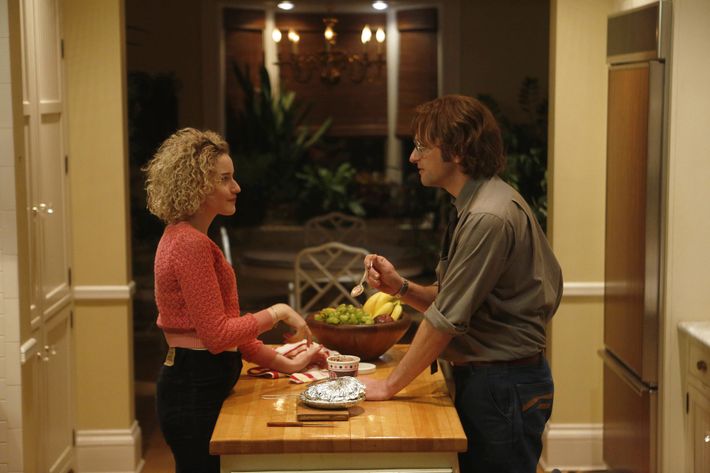
We talked a fair amount with Keri about the question of, “Is this an act of love and positive mothering in Elizabeth’s own way in season three, or is it something colder?” That was something we spent a lot of time talking about with her, not in the sense of her saying, “Well. I don’t think my character would do this,” but to make sure we were all on the same page in terms of how that relationship was playing out.
GE: You mentioned Kimmy, which was one of the most uncomfortable story lines for everyone watching it. Kimmy is back this season. Are we going to be thrust back into that type of situation with her?
JF: We’re not looking to retread the same thing. And one of the challenges for the show is we imagine a whole life going on for these characters and we pick and choose what scenes we’re showing. But to us, Philip is still meeting with Kimmy once every two weeks, and picking up that tape from her father’s briefcase. He’s still got to do that. It’s challenging because we don’t want to show every one of those scenes over and over again, but in our world that’s still living.
JW: We’ll return to them when something is happening that is of sufficient dramatic interest that it makes sense for us to show. And that might be in the next six months of their lives or a year or two years later. There’s a certain pressure of, well, you have this great story line next season. You can’t drop it. In fact, we get tweets and complaints: “Don’t drop the Kimmy story line.” It’s hard, we try not to feel pressure and to be patient and wait, and when we feel something is organically happening, then we’ll come back. And there’s a weirdness to that, because organically happening to a certain degree, that is from our brains. But on the other hand, our brains seem to produce something when it feels organically right in the lives of these characters, when something true would next develop.
GE: Martha was one character who viewers saw as comic relief early on. Is that how you viewed her?
JW: No, we get very sensitive about any suggestion of comedy.
JF: Tragic relief. It’s all tragedy.
GE: This season we see Philip and Elizabeth talking about Henry’s cologne …
JW: Oh, that was funny.
MZS: And they’re wearing wigs and makeup as usual.
JF: There’s funny stuff in the show. We talk a lot about Martha’s wedding. We think that was funny.
MZS: That was verging on Fletch. That actually was funny-funny.
JF: That was a very scary sequence for us actually, because we wanted to do it, we knew we were writing towards it, but when it got to doing it, the difference between verging on Fletch and being Fletch is a big difference.
MZS: You didn’t want to go full Fletch.
JF: We didn’t want to go full Fletch. We wanted it to feel real.
JW: How does the comedy in it not overwhelm the truth? That’s why that was the most tonally difficult sequence we ever had to do.
JF: It’s the difference between Tootsie and Fletch. We Tootsie-d it up.
MZS: You must be keenly aware that all it would take is a slight nudge to turn this show into camp.
JW: It’s very fragile. And sometimes a scene doesn’t come out. By the way, if the disguises are off five percent, and sometimes they are, it fucks up the scene.
JF: And we were just talking the other day about some of these disguises. One of the imperceptible ways it screws up the scene is it’s not just that it takes your eye off the scene and puts it on the disguise. It undermines the credulity of the whole scene. The purpose of their disguise is to be real. The purpose of their disguise is to disappear. And so if they’re wearing a wig that’s too funny or something’s that a little too distracting, it’s not only wrong for the audience, it’s wrong for them. So it’s misfiring in two regards.
GE: You’re working with three to five variations on how you’re going to end the show. Have you narrowed that down at all?
JF: You’ve caught us as we’re really digging into that very question of taking those ideas and making them more specific as we break what will be season five or seasons five and six.
JW: It’s variations on one ending, really. And we don’t know if it’s going to stick either. By the time we get there, it could be something totally different.
